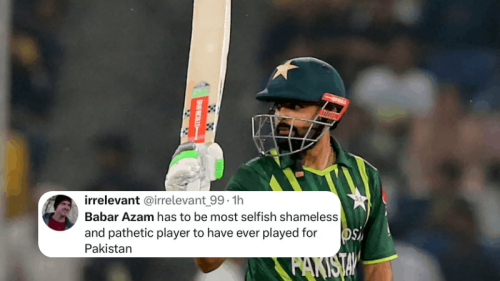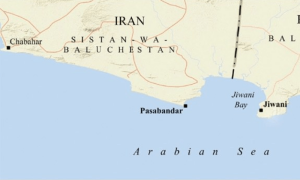ALMOST scrupulously avoided, central to the on-going debate on the violation of the Article 6 of the Pakistani constitution is the critical question who enacted the Oct. 12 coup? Although Gen Musharraf was the prime beneficiary, he was airborne at the time, and hence could not possibly be in touch with the ground forces at the GHQ.
Obviously, he couldn't have ordered the two trucks and a jeep packed with army personnel to roll down the Constitution Avenue all the way from the GHQ, to occupy the PTV station. This means that it was done either by the GHQ or by the Core Commander at Pindi in consultation with the top commanders.
But, then, why did either of them resort to this drastic exercise? This necessarily calls for a flash back — a flash back to the doings of Nawaz Sharif's heavy-mandated regime during the previous thirty-two months. Interestingly, that regime had already claimed the scalps of the heads of three institutions — the Judiciary (in November 1997), the Presidency (in December 1997), and the Armed Forces (in October 1998) — and had got loyalists installed in the first two. That in itself was a remarkable achievement of the civilian regime but it also, obviously, made the Army, which regarded its autonomy sacrosanct, wary of the regimes' next move.
Initially, despite Karamat's forced resignation, barely three months before he was due to retire, the relations between the government and the military were on an even keel, indeed cordial. Ziauddin had pointed out in his “Dateline Islamabad” column (November 15, 1999) how Musharraf perceived his relationship with the Sharif regime as a “partnership” between “the massive mandate [of the civilian government] and the military”. At the same time, the Army Chief made it clear, time and again, that “it would neither serve the personal interests of civilian leaders nor could it be pushed around”, as Hasan-Askari Rizvi, an authority on civil-military relations, notes in his Military, State and Society in Pakistan (2003).
Despite the government's political and economic mismanagement, Rizvi says, the military would have continued to play ball but for the Sharif government's increasing violation, since the Karamat ouster, of “the well-known norm of civil-military relations which emphasised respect for the military's autonomy and civilian non-interference in internal organisational matters and service affairs”. The top brass obviously resented Sharif's mounting interference “with promotion and the transfer of senior officers, including the posting of Corps Commanders,” and the cultivation of certain officers “by playing on Punjab ethnicity”. This burgeoning hostility came to be compounded all the more by the government's targeting of the Army Chief, Pervez Musharraf, for trenchant criticism for having allegedly launched the Kargil operations without the PM's prior approval, although it has transpired since then that all stakeholders were on board (see Shuja Nawaz, Crossed Swords).
The Army, obviously alarmed over the bleak prospect of a replay of the Karamat episode, felt that it would seriously erode the Army's autonomy and corporate entity, and hence had already decided to resist such a move, if resorted to. Subsequently, in mid-September, when Musharraf confronted Nawaz Sharif with hard evidence to get him replaced with a “loyal” general, Sharif, as a decoy, agreed to Musharraf being appointed as Chairman, Joint Chiefs of Staff Committee, as an additional charge, until the expiry of his term as COAS in October 2001.
A month later, when Musharraf was on an official visit to Sri Lanka, however, Sharif thought it opportune to put his original plans through. After a one-day hurried visit to the UAE on October 11, presumably to keep the MI in the dark, he tried to strike fast and hard. On October 12, the Director-General, ISI, was promoted, installed as Army Chief, and the state radio and television were ordered to broadcast the change of Army Command, and the TV to show the new Army Chief being decorated with the insignia of a full general and calling on the PM.
The newly appointed Army Chief was junior to several top commanders, nor did he command the confidence of the senior commanders. Earlier, in the afternoon of October 12, when the Principal Staff Officers at the GHQ and the Corps Commander, Rawalpindi, got wind of the impending change, they had asked the government to suspend the order until the Army Chief's return later that evening — but to no avail.
Thus, the television coverage proved to be the last straw, provoking the Army to move troops to Islamabad, take over the television station, cordon off the PM's residence and demand an immediate withdrawal of his orders. Upon his refusal, they arrested Nawaz Sharif and the newly appointed Army Chief. Before the PTV takeover, however, the government had (allegedly?) ordered the Karachi airport closed and the plane carrying Musharraf back home to land at an airport outside Pakistan, and later at Nawabshah. And, as noted earlier, all this happened when Musharraf was airborne and incommunicado.
Against this background the GHQ's move to take over the PTV at Islamabad and house-arrest Nawaz Sharif may be put down as an institutional response to the Sharif regimes' move to downgrade the Army, indeed the institution itself, twice within a brief spell of one year, and to brazenly violate the established norms of civil-military relations in Pakistan. From another perspective, the Nawaz regime, by rolling the heads of three institutions within a year, had prepared the country psychologically for a change-over.
Meantime, the other political forces were pro-active, and Nawabzada Nasrullah Khan, the “Baba-i-Jamhuriyet” as he was claimed then and later, had clobbered together a motley crowd of almost of all the political forces minus Nawaz Sharif's PML into a GNA, with a one point agenda “get Nawaz Sharif out”.
Not only had the opposition embarked on political mobilisation and street agitation. In tandem, several opposition leaders had also made direct or indirect appeals to the Army to get the Sharif government out. This obviously must have emboldened the GHQ to act on its own as it had happened previously in the case of Ayub, Yaha and Zia. No wonder, Benazir Bhutto contended in her article, “The Nawaz conviction” (Dawn, April 19, 2000) that “the popular discontent [in October 1999] gave the military the popular support needed to overthrow the Nawaz regime”. As Dawn had put it succinctly in its editorial (of August 5), “we have had military dictators because the polity has accepted, if not welcomed, them”.
Actually, after the coup, the GNA met in a gala celebration to welcome Nawaz Sharif's exit. The media whom the Sharif regime had assaulted and penalised during its tenure was soft on its exit while the liberal NGOs and circles heaved a sigh of relief at the indirect thwarting of Sharif's rash attempt to instal himself as “Amirul Momineen” after the impending March 2000 Senate elections which would provide him with a majority in the Senate to get the Fifteenth Amendment (“Shariah Bill”) passed into law.
That means almost all the political forces except for the dislodged PML had impliedly, if not directly, backed the coup. Some time later, the Supreme Court not only validated the military takeover but also gave the Musharraf regime a breathing space of three years as well as the authority to amend the constitution marginally within the four corners of the established principles on which the constitution was based. These developments meant that all the political forces minus the PML and the judiciary were complicit about the military takeover, sooner or later.
Now the question is whether there could have been a November 3, 2007 without an October 12, 1999. Obviously not. And what about their respective impact? The impact theory was enunciated by Qazi Faez Isa, the newly appointed Chief Justice of Balochistan. This he did in the Reality Show, “Enter the PM”, on DawnNews, masterminded by Hameed Haroon in February 2008. When Shafqat Jamote referred to the PML activists' storming of the Supreme Court in November 1997, Faez countered him by saying that that attack didn't matter much since it didn't spawn any radical (adverse?) consequences.
And if the impact theory is accepted in order to evaluate the gravity or significance of an event, what was the impact that these two events — October 12 and November 3 — had had, long-term and short terms. October 12 dislodged the 'heavy mandated' regime, dismissed the prime minister and the chief ministers, dissolved the NA, the Senate and the Provincial Assemblies, replaced the governors, introduced a new PCO, and changed a host of other things, top to bottom.
In contrast, the November 3 emergency spanned only a few misdemeanours a new PCO requiring the judges to take a fresh oath, sacking and quarantine of a large number of “rebellious” judges, and imposition of certain press restrictions, especially on the electronic media, being the most important and provocative. Almost everything else remained intact — except for Musharraf shedding his second skin, the uniform, getting the newly constituted Supreme Court to lift the ban on the notification of the presidential results, allegedly meeting Benazir Bhutto on the night of November 27 (which some electronic channels reported) for getting her concurrence to himself being sworn in for a second term and getting himself sworn in for a second term on November 28, announcing the date of the next elections and getting a caretaker government sworn in under the Senate Chairman, Mohammad Mian Soomro, one of the PPP's nominees for the assignment. (Remember, we are only juxtaposing and comparing the two episodes and by no chance validating or condoning the emergency.)
In view of the above, what is needed more is to go after the “culprits” of the October 12 coup. More so, because there would have been no November 3 without an October 12, the mother of all subsequent developments till the February 2008 elections. Since October 12 was enacted by the army as an institution, how could one possibly prosecute those manning the GHQ during Musharraf's absence? In the loop will also obviously come all those forces, parties and institutions that were or became complicit to October 12 before, on or after that watershed date. One could, therefore, easily understand the uneasiness felt by the Zardari-Gilani regime to the demand for the trial of the perpetrator(s) of the November 3 emergency. It is all too obvious that PML-N's insistence on it is primarily designed to score points, and push the PPP government, which had given assurances of safe passage to Musharraf, into a tight corner. However, even if the trial is confined to this event all those who were complicit to it either at the time or after will come within the loop.
Now the crucial question is Is it politic to break open Pandora's Box at this hour, engulfed as Pakistan is with serious concerns about security, sectarianism, law and order and economic downslide? Or should we bury the past and move ahead to tackle the problems galore that loom so large on the horizon?
All said and done, the issue of military takeovers, as the aforementioned editorial emphasised, “goes beyond legal niceties and constitutional safeguards. Until this country — the people, the politicians, the 'establishment', the media, civil society and the army — internalise the values of a constitutional democracy, democracy in this country will always be vulnerable to those promising quick-fix solutions and 'clean' politics”. As the above narrative indicates, none of these stakeholders had internalised the values of a constitutional democracy at the time of Sharif's exit, and that's why October 12 came to be enacted with impunity.
The writer, an HEC Distinguished National Professor, has recently edited Unesco's History of Humanity, vol. VI, and edited In quest of Jinnah (2007), the only oral history on Pakistan's founding father.
smujahid107@hotmail.com









































